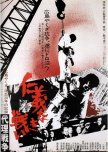Power plays and ticking time bombs
Returning the focus to Bunta Sugawara's gangster Hirono and the ongoing brutal power plays after the events of its predecessor, Proxy War ups the betrayal, scheming and chaos akin to that of a ticking time bomb, counting down to detonation. Alliances are formed only to be broken the next second, rival parties are reconciled only to go at it again the next day. It's definitely the most deliberately paced entry so far, a slow burn and a convoluted one at that to be sure, as the yakuza get richer and expand, they also grow more cautious, preferring to handle situations with mediators at a dinner table instead of in a dark alley with a knife. A real testament to Kazuo Kasahara's meticulously crafted screenplay. Kinji Fukasaku attempts to show some semblance of restraint in the chaos this time, taking his time to build the field of play before it all erupts in sudden assassinations and gangland violence, there's not as much blood as in previous instalments, but when violence erupts, you feel it. Fukasaku's use of widescreen filming techniques is on full display here, filling every inch of the frame with movement and colour. You could watch these scenes multiple times and each time focus on something different because every actor is doing something, unwilling to go unnoticed even when the scene is being powered by someone else. Everyone fights for your attention and thanks to the continually strong performances from the cast, they all demand it. Backed by another exceptional score by Toshiaki Tsushima, it's hard not to appreciate just how well Proxy War tells its story. It has enough going on to fill out a three-hour film but the fact that Fukasaku delivered that story in under two hours is rather amazing, a tight film with not a single wasted scene or subplot. While the film may lack some of the chaotic madness seen in the first two films it more than makes up for that with a clear vision and a deftly plotted screenplay.
Vond je deze recentie nuttig?







